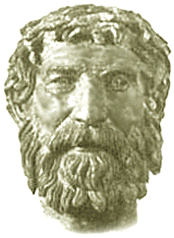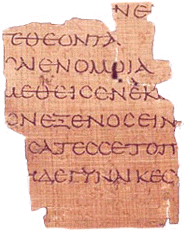...Best of Sicily presents... Best of Sicily Magazine. ... Dedicated to Sicilian art, culture, history, people, places and all things Sicilian. |
by Vincenzo Mormino | ||
Magazine Index Best of Sicily Arts & Culture Fashion Food & Wine History & Society About Us Travel Faqs Contact Map of Sicily |
Empedocles broadly believed in egalitarian principles, was reputedly a vegetarian and respected the rights of animals, believing that all living beings had spirits. He was a strong advocate of democracy when he felt it was under threat, openly despised the glorification of individuals, and was known to condemn the consumeristic materialism and gluttony of the citizens of Akragas. Interestingly, Empedocles viewed the survival and supremacy of certain forms of life as part of a grand struggle which some of today's scholars suggest, in some abstract way (at least philosophically), presages the ideas expressed in Darwin's theory of natural selection. He believed in a natural attraction ("love") and separation
("strife") governing relationships between the four "elements"
of earth, Empedocles was probably the last Greek philosopher to write in verse. Fragments of only two of his poems survive, namely "Purifications" and "On Nature." His observations imply that he was possibly a scientific deist, believing that a superior god created the universe and established physical laws without subsequently intervening in daily life on earth. One of his most noteworthy practical projects involved engineering: clearing the marshes of Selinus (Selinunte) in the years around 445 BC. He theorized that objects consisted of particles whose position changes with motion as the objects are moved --a basic supposition of modern physics. Yes, Empedocles was a man well ahead of his time. Circumstances of his death are hotly debated. The most colourful version is that he threw himself into Mount Etna, an active volcano (perhaps to see if the hot vapors would make him float in air), which spit back one of his bronzed sandals. It is more likely that he died in Greece around 420 BC.
About the Author: Vincenzo Mormino has written about wildlife and nature for Best of Sicily and hard-copy publications. | |
Top of Page |
 Empedocles was born around 494 BC in Akragas (now Agrigento)
and is best known as a Pre-Socratic philosopher of what is often called the Pluralist School,
though like many ancient philosophers he was also a poet and something of a scientist, having studied with
Pythagoras. He espoused the "cosmogenic" theory that all matter
was either earth, water, air or fire. He was one of the first scientists
to suggest that light travels at a constant velocity, and though he lived
long before
Empedocles was born around 494 BC in Akragas (now Agrigento)
and is best known as a Pre-Socratic philosopher of what is often called the Pluralist School,
though like many ancient philosophers he was also a poet and something of a scientist, having studied with
Pythagoras. He espoused the "cosmogenic" theory that all matter
was either earth, water, air or fire. He was one of the first scientists
to suggest that light travels at a constant velocity, and though he lived
long before  water,
air and fire. He thus postulated that harmony among the four was an essential
factor in relationships among them, and between the elements and people.
This "holistic" concept, though admittedly abstract by today's
standards, coincides with certain philosophies known in the East (i.e. in
China and India) and generally accepted (if after a fashion) by today's
leading scientists, environmentalists and philosophers; recognition of the
dangers of global warming is an example of this. Even his contemporaries
considered Empedocles a bit eccentric, though they greatly respected his intellect.
water,
air and fire. He thus postulated that harmony among the four was an essential
factor in relationships among them, and between the elements and people.
This "holistic" concept, though admittedly abstract by today's
standards, coincides with certain philosophies known in the East (i.e. in
China and India) and generally accepted (if after a fashion) by today's
leading scientists, environmentalists and philosophers; recognition of the
dangers of global warming is an example of this. Even his contemporaries
considered Empedocles a bit eccentric, though they greatly respected his intellect.